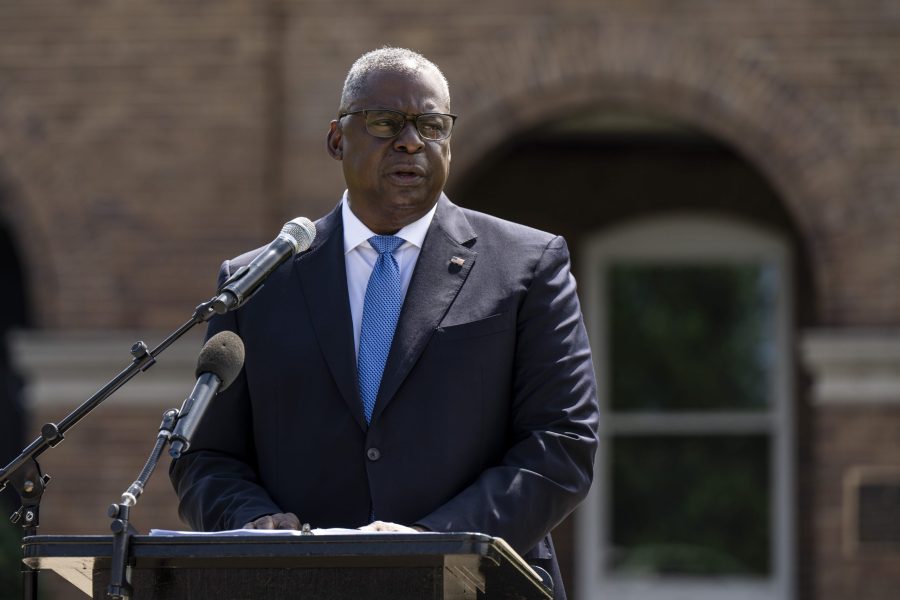As the Marine Corps found itself without a Senate-confirmed Commandant for the first time in 165 years, Defense Secretary Lloyd J. Austin III begged lawmakers to end the months-long delay in confirming senior military leaders.
Austin made his comments as former Commandant Gen. David H. Berger retired without a confirmed successor on July 10, and just 24 hours before the start of Air Force Gen. Charles Q. Brown Jr.’s confirmation hearing to become Chairman of the Joint Chiefs of Staff.
More than 200 general officer appointments are caught up by a hold imposed by Sen. Tommy Tuberville (R-Ala.) on March 8, in protest over a Pentagon policy that provides paid leave and travel expenses for service members seeking abortion or other reproductive health services not available where they are stationed.
With Berger’s retirement, the Marines are wthout a confirmed Commandant for the first time since Archibald Henderson died in 1859.
“You know, it’s been more than a century since the U.S. Marine Corps has operated without a Senate-confirmed commandant,” Austin said at Marine Barracks Washington. “Smooth and timely transitions of confirmed leadership are central to the defense of the United States, and to the full strength of the most powerful fighting force in history. Stable and orderly leadership transitions are also vital to maintaining our unmatched network of allies and partners.”
Assistant Marine Corps Commandant Gen. Eric M. Smith, who was nominated to replace Berger, will be Acting Commandant until the Senate votes on his nomination.
It is rare for any of the military services to operate without a confirmed service chief: The last time the Air Force had an Acting Chief was in 2008, the Navy in 1996, and the Army in 1972.
But unless Tuberville removes his hold, it’s likely that Smith will be the first of several, as four of the five service chiefs are all preparing to leave their posts. Army Chief of Staff Gen. James C. McConville and Chief of Naval Operations Adm. Michael M. Gilday both hit the end of their four-year terms this summer. And with Chairman of the Joint Chiefs of Staff Gen. Mark A. Milley’s term ending Oct. 1, and Brown nominated to replace him, the Air Force may also find itself without a confirmed Chief of Staff.
Brown faces the Senate Armed Services Committee on July 11, where Tuberville, a member of the committee, could press Brown on the abortion travel issue.
Brown is expected to win bipartisan support, having been confirmed 98-0 to be Air Force Chief of Staff in 2020. The committee can vote to approve his nomination and send it to the Senate floor after the hearing, but once there, it will join the growing backlog. To circumvent Tuberville’s hold, the Senate could hold roll-call votes on individual nominees, but Senate Democrats appear unwilling to do that, saying it would incentivize Tuberville to keep his hold in place and could incentivize others to follow suit. Trying to approve every single nominee through regular votes, they argue, would take months.
The National Defense Authorization Act is the likely mechanism for resolving the issue, either by amending the bill to block the Pentagon policy or to codify it into law. But Tuberville has told reporters he does not want to address the issue in the NDAA. The House is set to consider and vote on its version of the NDAA this week.
Meanwhile, planned moves for senior military officers and their families remain in limbo—a fact Austin highlighted in his remarks.
“Our military families give up so much to support those who serve—so they shouldn’t be weighed down with any extra uncertainty,” he said. “We have a sacred duty to do right by those who volunteer to wear the cloth of our nation, and their families. I remain confident that all Americans can come together to agree on that basic obligation to those who keep us safe.”
Yet Austin expressed confidence that “the United States Senate will meet its responsibilities.”
“I look forward to welcoming an outstanding new Commandant for our Marine Corps, and to adding many other distinguished senior leaders across the Joint Force,” he added.
